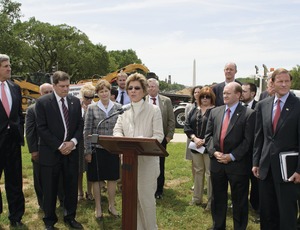
With highway and transit authorizations due to expire on June 30 and no Senate-House agreement yet on a new, longer-term measure, leaders of both chambers have directed their key negotiators to intensify their work to produce a bill.
At a June 19 meeting at the Capitol, Senate Majority Leader Harry Reid (D-Nev.) and House Speaker John Boehner (R-Ohio) told Senate Environment and Public Works Committee Chairman Barbara Boxer (D-Calif.) and House Transportation and Infrastructure Committee Chairman John Mica (R-Fla.) "to redouble our efforts," Mica said.
Since May 8, both sides have been trying to work out differences between a $109-billion, two-year highway-transit bill that the Senate passed in March and a three-month extension—with controversial non-transportation provisions—that the House cleared in April. But they made little headway.
The June 19 meeting came several days after each side publicly criticized the other for a lack of progress. On June 13, Boxer said, "There is only one group standing in the way of the bill … those are the House Republicans." The next day, Mica said, "The Senate has refused to offer any substantive cuts to bureaucratic red tape associated with building a highway or bridge and … does not appear ready to compromise" on House language directing fast approval of the Keystone XL oil pipeline.
On June 7, Boehner said that if there's no agreement by June 30, he would pursue a six-month extension. But industry groups say a six-month bill would further weaken the Highway Trust Fund and cause states to cut transportation spending as the construction season hits its peak.



Post a comment to this article
Report Abusive Comment